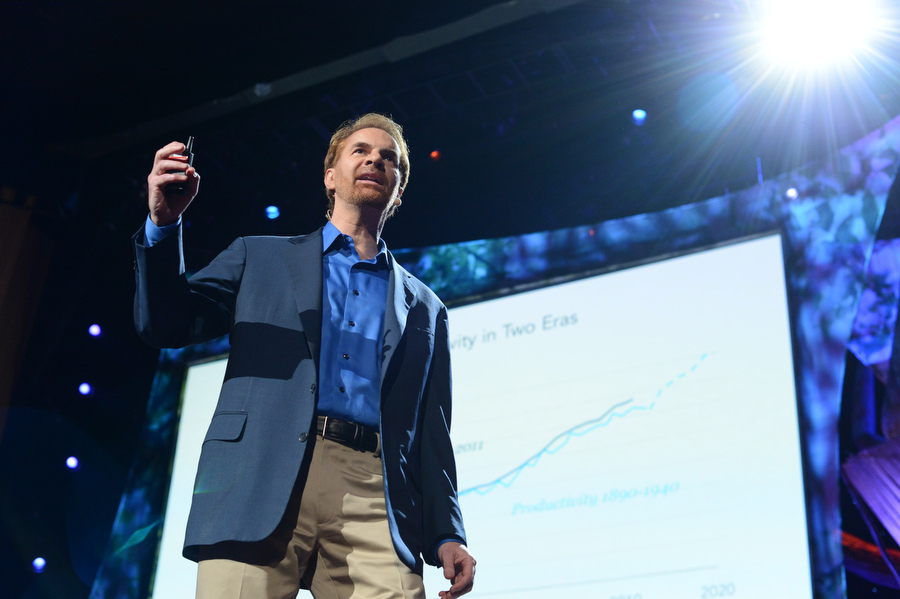Erik Brynjolfsson says growth is not dead. To make his case in session 1 of TED2013, he points out two moments in the past — one that took place 120 years ago and the other that took place about 15 years ago.
One hundred and twenty years ago, the Second Industrial Revolution began. But while the tools had been invented for mass production to go into effect, productivity didn’t increase for another three decades. Why? Because while the first waves managers replaced steam engines with electric motors, they didn’t radically redesign their systems and workflows. It took a generation for the old ways to be abandoned and new norms to be established. Then, productivity soared.
Brynjolfsson, the director of the MIT Center for Digital Business, wonders if we might be in the transition period when it comes to our industrial revolution, computers and the digital age. Interested in the way IT affects organizations, markets and the economy, Brynjolfsson notes that productivity is becoming decoupled from income and employment. But this isn’t a doomsday scenario.
“These troubles are sometimes misdiagnosed as the end of innovation,” says Brynjolfsson. “But they are actually growing pains of what I and Andrew McAfee call the new machine age.”
This new machine age is about idea production, rather than physical production. This new machine age is also unique because it is measurable (hello, big data), combinatorial (meaning that innovations can be remixed) and exponential, meaning that it advances at an incredibly rapid pace.
“Computers get better fast than anything ever before,” says Brynjolfsson. “A child’s PlayStation today is more powerful than a military supercomputer from 1996.”
Machines are even starting to be able to learn. Brynjolfsson points to IBM’s Watson who was not so good at the game Jeopardy, but improved very quickly, soon beating the world Jeopardy champion. Watson is just 7-years-old now and is learning skills all the time. He’s even applying for some jobs.
“The full implications of the new machine age are going to take at least a century to play out,” says Brynjolfsson. But he admits that, for now, the growing pains are very real. People in a wide slew of industries are being replaced by digital labor and losing their jobs — not to mention their ability to find a new one.
Speaking of a human tax consultant versus TurboTax, Brynjolfsson says, “How can a skilled worker compete with a $39 piece of software? She can’t … People are racing against the machine, and many of them are losing that race.”
So what can we do to make sure that our prosperity continues? “The answer is not to try to slow down technology,” says Brynjolfsson. “We need to race with the machine.”
This brings us to the moment Brynjolfsson wants us to remember from 15 years ago — when grandmaster Garry Kasparov played IBM supercomputer Deep Blue in a game of chess. Kasparov won. But in a rematch a year later, Deep Blue came out the victor. Soon, however, a new kind of chess game was played. In this match, humans and computers could collaborate if they wanted. In this game, it wasn’t a grandmaster or a computer who won — the winner was a human-computer collaboration. Team of humans and computers could not be beat.
The answer, says Brynjolfsson, is doing the thing that humans do best — thinking — while working with machines, doing what they do best.
Brynjolfsson ends his talk with the bold words: “Racing with the machine beats racing the machine.”
Erik Brynjolfsson’s talk is now available for viewing. Watch it on TED.com »

Comments (12)
Pingback: Buy Steroids USA
Pingback: Assignment 2 – New Media Design
Pingback: “The Robots Are Coming, Mr Mnuchin” by Lawrence H. Summers | EuroReads
Pingback: Surprised by Mnuchin over technology’s lack of impact on jobs | Larry Summers blog
Pingback: Larry Summers: The robots are coming, whether Trump’s Treasury secretary admits it or not | Later On
Pingback: O Voo do Iludido | francbreno
Pingback: Do Startups matter? | India Law for India Startups
Pingback: Beware of the TAR Pits! – Part Two | e-Discovery Team ®
Pingback: The Second Machine Age | Delightful & Distinctive COLRS
Pingback: Geeky Bytes | Why the Terminator Should Be Your Best Friend
Pingback: Are We Standing at the End of Times or Before an Intoxicating Dawn? | ReThink GP
Pingback: Wizmo Blog » Blog Archive » Race with the machines: Erik Brynjolfsson at TED2013